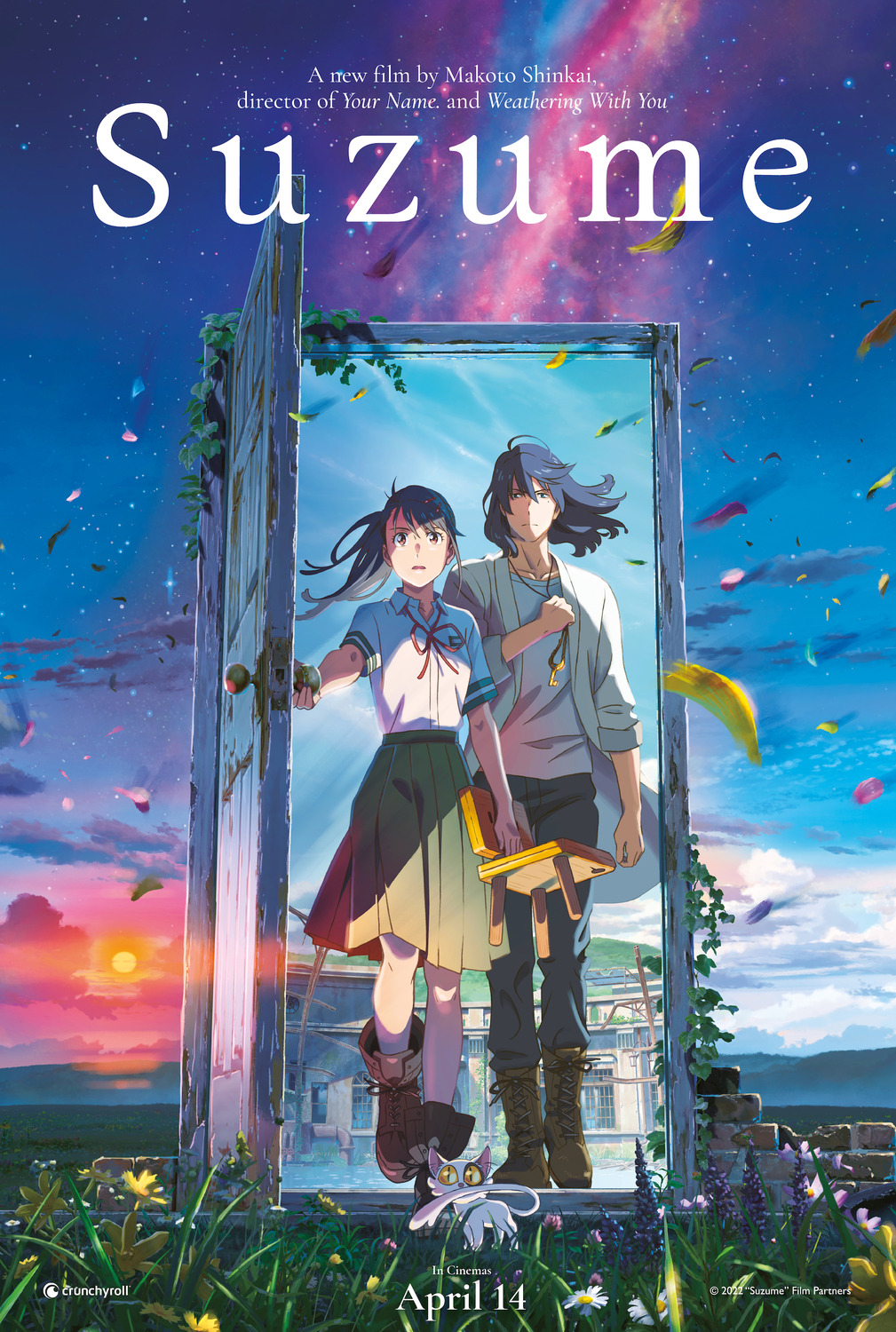Director
Makoto Shinkai
Starring
Nanoka Hara
Hokuto Matsumura
Ann Yamane
One morning, on the way to school, Suzume [Hara] runs into a young man, Sōta [Matsumura], who asks if there are any abandoned areas nearby. Suzume offers directions but then follows the young man, only to find a door in the middle of a derelict onsen. Opening the door reveals a beautiful nighttime vista but one she cannot seem to crossover to. Shortly afterwards, a giant glowing entity, that seemingly only Suzume can see, is released and threatens to lay waste to her town. With Sōta’s help, Suzume is able to close and lock the door. However, in doing so, Suzume accidentally releases the keystone: a mischievous cat named Daijin. And so, Suzume and Sōta must track Daijin, closing doors on their journey, and uncovering the mystery of the dark dreams that have disturbed Suzume’s rest. Oh, and to complicate matters further, Sōta has been cursed and turned into a three-legged chair.
When it comes to Shinkai’s films, it’s impossible not to open by fawning over the visuals. Whether a passing comment, or full-on untethered love letter, the visual treat on display is unrivalled in a medium already replete with bold possibility. Yes, that is a grand statement, but between The Garden Of Words, Your Name and Weathering With You, CoMix Wave have produced a body of work that really tears ahead and will long be viewed as the bar to clear. That being said, showing to depict Namazu – the giant worm-like malevolent force that threatens to wipe out Japan – as a big veiny phallus was.. a choice. On top of the visual spectacle, Radwimps and Kazuma Jinnouchi are back with a score that goes from subtle and understated to thundering and commanding, with a soupçon of energetic jazz and throwbacks to classic 70s and 80s pop.
From the very outset, Suzume flies head first into a fast-paced narrative that never really lets up. Starting in Miyazaki, before becoming a road trip across Japan, filled with the usual product placement, subtle tourism-driving efforts and earnest celebration of the Japanese landscape. But more than this, Suzume is a little different from its sister-productions. While Your Name and Weathering With You had plenty of fantastical elements, they remained predominantly grounded in their world-building and execution. Suzume, on the other hand, is more concerned with the sense of adventure, and spends less time trying to convince the audience what’s taking place is real. Granted, this could lead certain viewers to grumble about the idea of a 17 year old travelling across the country unaccompanied as ‘unrealistic’ but to do so would be to lose focus of the film’s allegorical nature and the inward journey the narrative is driving at.
Part of the reason Shinkai has the terrifying pressure of the name Miyazaki added to reviews of his films is not only the stunning imagery, but his ability to capture an earnest sense of adventure; one that young adult fiction has lost in recent years. Yes, there’s the undertones of the weight and expectation put on the next generation’s shoulders to “fix the world” but it does it frankly, without a sarcastic half smile, or the need for cynicism.
And, frustratingly, that specific element is one which could be lost in translation – at least, the full significance of what this film is trying to say. See, beneath the surface of this story is a much more meaningful tale, surreptitiously disguised. All over the world we can see the effects of the climate crisis and it’s evident that action desperately needs to be taken. Japan has more than its fair share of traumatic experiences with regular earthquakes, typhoons and tsunamis, but also a waning population that leads to towns wiped out or completely abandoned. And it’s this message that Shinkai wants to bring attention to: a story of courage and determination in the face of utter hopelessness and oblivion, a story of lives lost, and a story of coming to terms with grief. Again, it’s hard not to draw comparisons with Your Name and Weathering With You, which both have strong emotional foundations, but this feels different. And subsequently, while the surface-level unfolding love story is compelling, it’s the wider pangs of loss and heartache that are more engrossing and bring an unexpected maturity to this whimsical parable.
But – and it’s the only ‘but’ I really have to offer – this movie isn’t sheer perfection. There’s one substantial concession that really scuffs this movie’s sheen. The final act feels a little disconnected and cuts the momentum right out from under it. A fairly short assessment, but an utter gut punch. For a film racing ahead, with so little time for explanation, trusting that the audience will catch up and match its momentum, the story reaches a crescendo and then slams on the brakes. Diverting for some important exposition and much needed lightheartedness, the velocity slows to a crawl and all the urgency falls away. And for a two hour movie, you do have to wonder if some of these elements could have been refined, just a touch, to round out an all-but stellar release. What’s more, greedily, fans will want to know “What’s next?” And it’s so hard to type “you need to pivot next time” when the person in question is making consistent gold, but there is a worrying sameyness to Shinkai’s work. All magnificent, all highly commendable but to take a single panel out of context could make it near impossible to identify which release it came from. That said, like looking for hairline cracks in a masterpiece, this minor stumble can’t stop this feature from being a solid 5/5.
Release Date:
14 April 2023
The Scene To Look Out For:
One word at the core of every scene is “emotion.” And while Suzume’s personal introspective journey is some of the most emotionally charged content that Shinkai has produced (far too good to be spoiled here), this is also present in the kinetic and vibrant action set pieces. One in particular takes place at an abandoned carnival. Here we get Suzume trying to close the door on a moving ferris wheel cart, Sōta leaping from track to track on a rollercoaster trying to catch Daijin, and the hypnotic beckoning void beyond the open door. The tension, direction, sound design, vocal performances and music all come together to produce truly sublime cinema.
Notable Characters:
In both a positive and negative light, Daijin is really hard to read. Voiced adorably by Yamane, the magical cat is bold, mercurial, amusing and full of whimsy. But this makes the character hard to read as villain, ally or simply the personification of otherworld impishness. And means that certain character developments can feel a little abrupt or puzzling at times. Though, thankfully, not too much.
Highlighted Quote:
“Um.. why are you a chair?”
In A Few Words:
“A beautifully crushing tale of healing.”
Total Score: 5/5

![The Red Right Hand Movie Reviews [Matthew Stogdon]](https://reviews.theredrighthand.co.uk/wp-content/uploads/2021/12/cropped-header1.png)

![WEATHERING WITH YOU [天気の子] movie review poster](https://reviews.theredrighthand.co.uk/wp-content/uploads/2021/12/703weathering-150x150.jpg)

